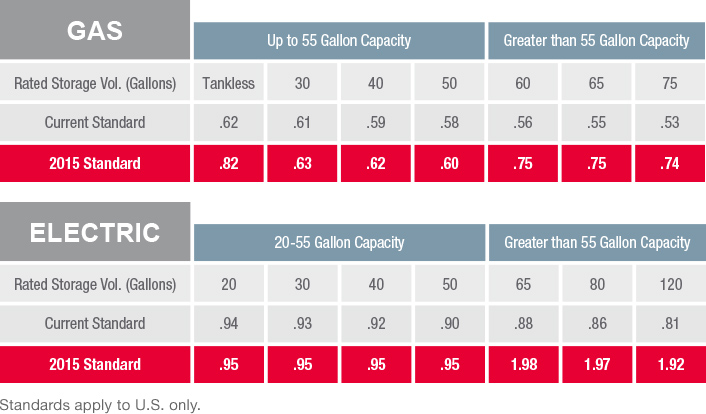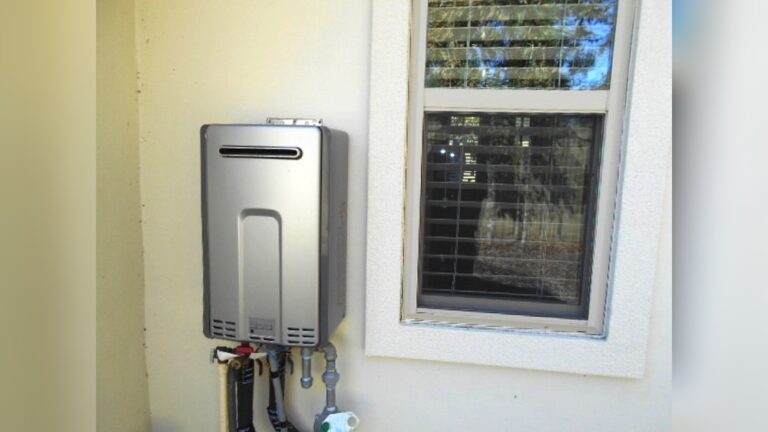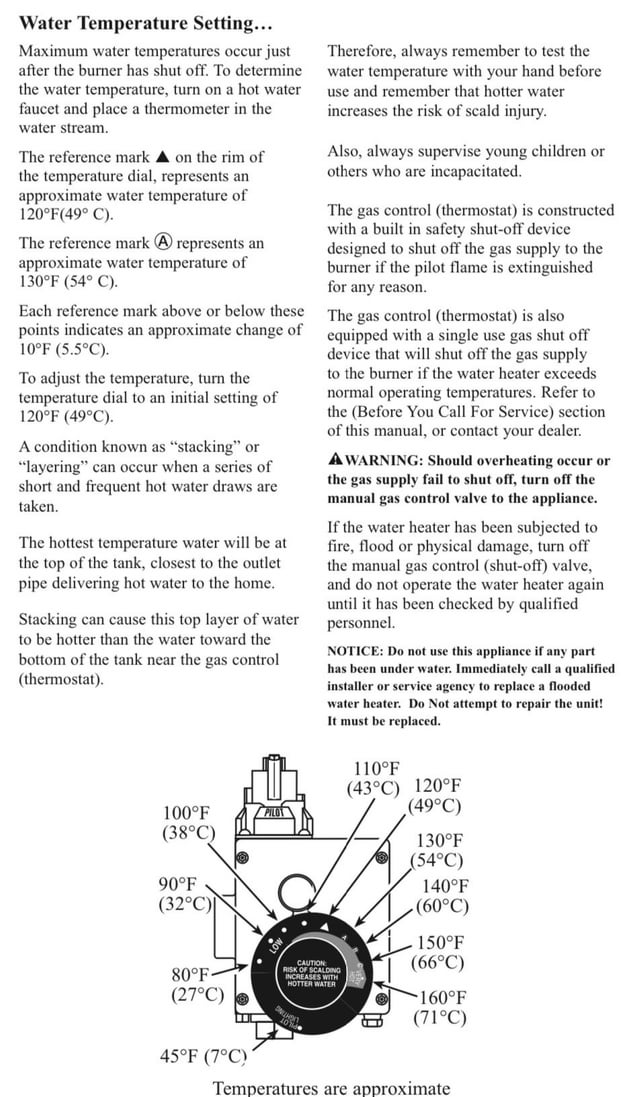Are you tired of skyrocketing energy bills and an inefficient water heater that’s draining your wallet? You’re not alone.
Choosing the right water heater can be a daunting task with so many options available. But what if there was a simple way to compare them all at a glance? Enter the Water Heater Efficiency Comparison Chart—a tool designed to simplify your decision-making process.
By understanding the efficiency ratings and performance of different models, you can make an informed choice that saves you money and reduces your environmental footprint. Dive into this comprehensive guide, and discover how the right water heater can transform your home’s energy efficiency. Your journey to smarter, more sustainable living starts here.
Types Of Water Heaters
Water heaters come in various types, each with unique features. Choosing the right one can improve efficiency and save money. Understanding these types helps make informed decisions.
Tankless Water Heaters
Tankless water heaters heat water on demand. They don’t store hot water. This saves space and energy. They have high efficiency and lower operating costs. Installation might be expensive. They are ideal for small spaces.
Storage Water Heaters
Storage water heaters have a tank. They store heated water until needed. The tanks vary in size. Larger tanks can serve more people. They are less efficient than tankless heaters. They have lower upfront costs.
Heat Pump Water Heaters
Heat pump water heaters use air or ground heat. They are energy-efficient. They work best in warm climates. They need space for installation. Initial costs can be high. They can reduce electricity bills.
Solar Water Heaters
Solar water heaters use solar panels to heat water. They are eco-friendly. They depend on sunlight for efficiency. They have low operating costs. Installation costs can be high. Ideal for sunny locations.

Credit: automaticheating.com.au
Factors Affecting Efficiency
Understanding the factors affecting water heater efficiency can save energy and costs. Several elements influence how effectively a water heater performs. Knowing these can help make an informed decision when selecting a water heater for your home.
Energy Source
The energy source is a key factor in water heater efficiency. Electric heaters may have lower upfront costs but often result in higher energy bills. Gas heaters can be more efficient, depending on the model and usage. Solar-powered heaters offer an eco-friendly option, reducing electricity consumption.
Insulation Quality
Insulation quality significantly impacts a water heater’s efficiency. Good insulation reduces heat loss, keeping water hot for longer. This means the heater uses less energy to maintain temperature. Checking the R-value of insulation can help you choose an efficient model.
Water Usage Patterns
Water usage patterns also affect heater efficiency. Frequent use requires a heater with quick recovery times. A high-efficiency model can better handle varied demand. Consider family size and daily water usage when selecting a heater.
Climate And Environment
Climate and environment play a role in water heater efficiency. In colder climates, heaters work harder to maintain temperature. This can increase energy consumption. In warmer areas, heaters may not need to work as hard, improving efficiency.
Energy Efficiency Ratings
When choosing a water heater, understanding energy efficiency ratings can save you money and help the environment. These ratings tell you how efficiently a heater converts energy into hot water. If you’re like me, sometimes the technical jargon gets overwhelming. But once you grasp a few key terms, making an informed choice becomes easier. Plus, you get to enjoy those warm showers guilt-free, knowing you’re saving on energy bills.
Understanding Energy Factor (ef)
The Energy Factor (EF) is a measure of a water heater’s efficiency. It indicates how much hot water is produced per unit of fuel consumed in a day. A higher EF means better efficiency. Imagine seeing a number like 0.80 on a chart; this means 80% of the energy goes into heating water, while 20% is lost. So, if you’re looking to maximize efficiency, aim for water heaters with higher EF ratings.
Annual Fuel Utilization Efficiency (afue)
Annual Fuel Utilization Efficiency (AFUE) is mostly used for gas and oil heaters. It measures how efficiently a unit converts fuel into heat over a year. If your heater has an AFUE of 90%, it uses 90% of its fuel to heat water, wasting only 10%. Picture this: you’re reducing waste and saving money on fuel by choosing a heater with a high AFUE. Wouldn’t you prefer fewer surprises on your energy bill?
Uniform Energy Factor (uef)
The Uniform Energy Factor (UEF) is the latest standard for measuring water heater efficiency. It provides a more accurate picture by considering different patterns of hot water usage. Whether you’re an early riser or a night owl, UEF helps you understand how efficient your heater is based on your lifestyle. So, when you’re comparing heaters, look for a higher UEF rating that matches your usage habits. Why settle for less when you can have a heater that works as hard as you do?
Understanding these ratings can transform how you view your water heater options. Do you really want to keep paying more for less efficiency? Knowing what these numbers mean can make a big difference in your choice. Imagine the satisfaction of seeing lower energy bills and knowing you made a smart choice. Isn’t it time you enjoyed hot showers without the worry of high energy costs?
Cost Savings Analysis
A Water Heater Efficiency Comparison Chart helps identify cost savings by comparing different models. This analysis reveals which heaters use less energy, lowering utility bills. Understanding these differences can guide better purchasing decisions.
When considering a new water heater, you might be focused on the upfront cost. But have you thought about the long-term savings? A water heater efficiency comparison chart can be your best friend here, helping you make a smart financial decision. It’s not just about what you spend today, but how much you save tomorrow. Let’s break this down into key areas you should consider before making your purchase.Initial Investment Vs. Long-term Savings
The initial cost of a water heater can be daunting. You might be tempted to pick the cheapest option. However, a higher upfront cost can lead to significant savings over time. Think of it like buying a good pair of shoes. Spending a bit more might mean they last longer and feel better. Consider models with higher efficiency ratings. They tend to pay for themselves over the years with lower energy bills.Maintenance And Repair Costs
How often do you want to call a repair technician? Some water heaters require more maintenance, while others run smoothly for years. Research the average lifespan and repair costs of different models. Sometimes, investing a little extra initially can save you from frequent repair headaches. Look for models that come with extended warranties; these can be lifesavers.Energy Consumption And Utility Bills
Have you ever gasped at your utility bill? The type of water heater you use can play a big part in those costs. Efficient models often consume less energy, which means lower utility bills. Check the Energy Factor (EF) rating or the Uniform Energy Factor (UEF) rating on the chart. A higher rating usually means more savings on your bill. Ask yourself, would you rather pay a bit more now and save monthly, or save now and pay more each month? The choice affects your wallet in the long run. In your journey to choose the perfect water heater, remember that the numbers on a chart aren’t just figures; they’re your potential savings. How much are you willing to invest in your future peace of mind?Environmental Impact
Understanding the environmental impact of water heaters is crucial. Different types of water heaters affect the planet in various ways. By comparing their efficiency, we can choose the most eco-friendly option. This helps in reducing pollution and conserving resources. Let’s explore the environmental aspects of water heaters.
Carbon Footprint Reduction
Water heaters contribute to carbon emissions. Choosing an efficient model lowers this impact. Electric heaters often have a smaller carbon footprint. They use cleaner energy sources. Gas heaters, though efficient, may emit more carbon. Opt for models with higher efficiency ratings. This choice helps reduce overall emissions.
Resource Conservation
Efficient water heaters conserve resources. They use less water and energy. This reduces the strain on natural resources. Tankless water heaters are a good example. They heat water only when needed. This minimizes waste and saves energy. Choosing a model with a high Energy Factor (EF) is ideal. It signifies better resource use.
Renewable Energy Options
Renewable energy water heaters are gaining popularity. Solar water heaters use the sun’s energy. They offer a sustainable option. Heat pump water heaters are another choice. They use ambient air to heat water. This reduces reliance on fossil fuels. Opting for renewable options benefits the environment. They can also lower energy bills over time.

Credit: www.pinterest.com
Choosing The Right Water Heater
Explore the efficiency of various water heaters with our comparison chart. This tool helps you find the best option for energy savings and cost-effectiveness. Choose wisely to ensure your home stays warm efficiently.
Choosing the right water heater can feel overwhelming, especially with so many options on the market. Whether you’re upgrading or installing a new one, the decision impacts not just your comfort but your wallet too. Understanding your specific needs can help you make a smart choice that balances efficiency and cost-effectiveness.Home Size And Demand
Consider the size of your home and the number of people living in it. A small apartment might only need a tankless water heater, which heats water as needed, saving space and energy. In contrast, a large family home might benefit from a traditional tank water heater with a larger capacity to meet higher water demands.Budget Considerations
Your budget is crucial when selecting a water heater. While tankless models can be more expensive upfront, they might save you money in the long run through lower energy bills. On the other hand, traditional tank heaters often have a lower initial cost, making them appealing if you’re looking to save money immediately.Energy Efficiency Priorities
If you’re prioritizing energy efficiency, look for water heaters with high Energy Factor (EF) ratings. Heat pump water heaters, for example, are known for their efficiency, using electricity to move heat rather than generating it directly. Think about how much you’re willing to invest in reducing your carbon footprint and saving on energy bills over time. Choosing the right water heater is not just about ticking boxes. It’s about understanding your lifestyle, needs, and values. Have you ever had to take a cold shower because your water heater couldn’t keep up? That experience alone might guide you towards a more efficient model. What are your priorities when selecting a water heater?Installation And Maintenance Tips
When it comes to enhancing the efficiency of your water heater, understanding the right installation and maintenance practices is crucial. Proper installation and regular upkeep can save you money and energy while ensuring your system operates smoothly. Let’s dive into some practical tips that can make a real difference in your water heater’s performance.
Professional Installation Vs. Diy
Deciding between professional installation and DIY is a choice many homeowners face. A professional installer brings expertise and guarantees, reducing the risk of errors. Imagine saving time and avoiding potential damage to your system. On the other hand, DIY can be rewarding if you have the right skills. You can learn more about your system and save on costs. However, ask yourself: are you confident enough to handle unexpected challenges?
Regular Maintenance Routines
Regular maintenance is key to prolonging the life of your water heater. Simple tasks like checking the temperature settings and inspecting the anode rod can prevent significant issues. You might be surprised at how a quick flush of the tank can enhance efficiency. Adding these routines into your calendar ensures they don’t slip through the cracks. Are you ready to make maintenance a habit?
Troubleshooting Common Issues
Understanding common issues can empower you to tackle problems before they escalate. Is your water not getting hot enough? It could be a thermostat issue. Hearing strange noises? Sediment buildup might be the culprit. Knowing what to look for can save you time and stress. Next time something feels off, will you be prepared to diagnose the issue yourself?
Incorporating these installation and maintenance tips can significantly impact your water heater’s efficiency. Whether you’re a DIY enthusiast or prefer professional help, the right approach will keep your system running smoothly. Remember, regular attention to detail can prevent bigger problems down the line. What steps will you take today to ensure your water heater remains efficient?
Comparing Brand And Model Options
Choosing the right water heater can save money and energy. Comparing different brands and models helps find the best fit for your home. Not all water heaters are created equal. Some offer better efficiency, durability, or advanced features. A detailed comparison can make a big difference in long-term satisfaction. Understand what each brand and model offers. This section will guide you through top brands, features, and consumer feedback.
Top Rated Brands
Several brands stand out in water heater efficiency. Rheem, A.O. Smith, and Bosch are popular choices. They offer reliable performance and energy-saving designs. Rheem is known for innovative technology. A.O. Smith provides a wide range of options. Bosch offers compact and efficient solutions. Each brand has unique strengths. Comparing them helps identify the best match.
Model Features And Specifications
Different models come with varying features. Look for energy efficiency ratings. Consider tank size and recovery rate. Some models have smart controls. Others offer advanced safety features. Specifications can affect heating speed and cost. Understand what each model provides. This knowledge can aid in making an informed choice.
Consumer Reviews And Recommendations
Consumer reviews offer valuable insights. They reflect real-world experiences. Look for feedback on performance and reliability. Read about installation ease and maintenance needs. Recommendations often highlight standout models. They can guide your decision-making process. Reviews provide a practical perspective. They help weigh pros and cons of each option.

Credit: hodgesandsonsplumbing.com
Conclusion
Choosing the right water heater can save energy and money. Different heaters offer varying efficiency levels. Electric heaters are common but can be costly. Gas heaters heat quickly but may require ventilation. Solar heaters use renewable energy, helping the environment.
Heat pump heaters work well in warm climates. Each type has pros and cons. Consider your needs and budget. Check efficiency ratings before buying. This ensures you get the best performance. Aim for a balance of cost and efficiency. A wise choice benefits both your wallet and the planet.
Happy choosing!



